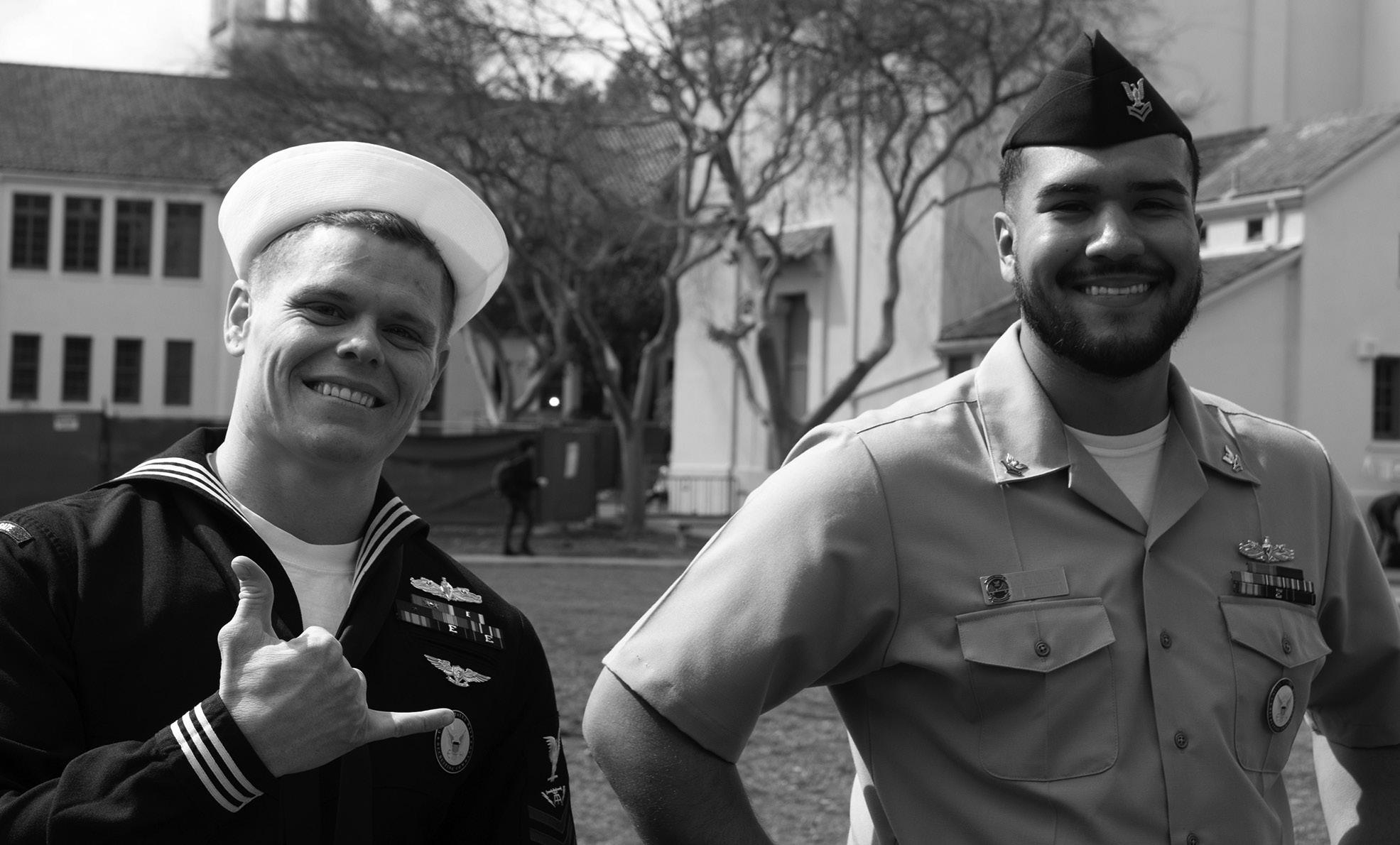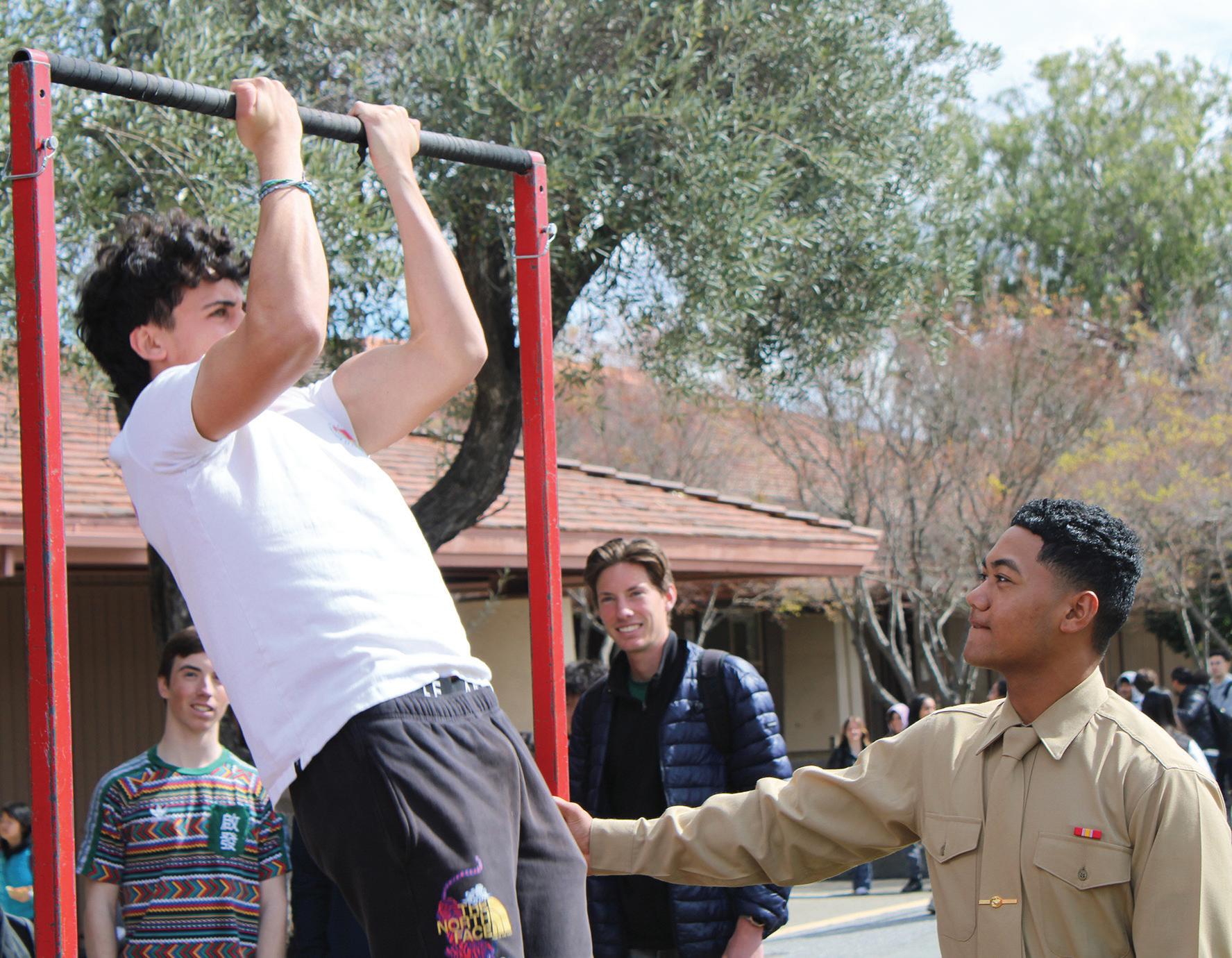
3 minute read
ReEvaluating Recruitment
Military Aims For Student Enlistments
AMID THE USUAL RUSH of students on the Palo Alto High School Quad during lunch, a ruby red pull-up bar stands in front of the library. One by one, students line up, eager to prove their strength as a crowd of onlookers gathers.
This pull-up bar is accompanied by a series of tables displaying flyers promising a fresh start and recruiters with wide smiles explaining the plethora of opportunities available to students after they graduate.
Despite the fanfare, according to an anonymous opt-in survey by Verde Magazine of 175 Paly students from Feb. 5 to Feb. 9, over 90% said they are not interested in a career in the military, despite twothirds of them encountering these recruitment efforts on campus.
Regardless of the level of interest, Paly is legally mandated to allow the military onto campus twice a year as part of the Elementary and Secondary Education Act of 1965. Paly is also mandated to provide addresses, names and phone numbers of students to military recruiters if requested.
Recent recruitment initiatives have sparked debate over the extent to which the Palo Alto Unified School District should grant access and authority to the military, and about the broader role of the military for younger Americans.
Senior Sofia Vincent said she believes that the presence of military recruiters on campus is inappropriate in its context.
“The way they [recruiters] show up on campus and have the whole pull up bar setup, it kind of feels like its inflating people’s egos, and [having them] showing off as this feat of strength, rather than a serious decision in which you may have to kill someone,” Vincent said.
Sgt. First Class Matthew Hahn, a high school recruiter for the Army, said that while many high schools allow for more robust access, some campuses including Paly only allow visits once per semester, which Hahn said he believes is inadequate.
“When I was recruiting down in LA, all the schools were allowing us access every week,” Hahn said. “So by going there, every week, we're able to build relationships with students and have a better understanding of who a student is, what their goals are.”
According to an article in Current Affairs, recruiters often pressure students into enlisting, visiting lower-income and predominantly minority schools more than 10 times as much as wealthier schools in some instances in order to attract more desperate candidates who are unable to afford a four year institution.
However, according to Hahn, military recruiters are simply attempting to raise awareness of a military career and not trying to find as many students as possible to enlist.
In his two years of recruitment, Hahn said that while students have been enlisted from other local high schools, no students have been enlisted directly from Paly.
Despite the lack of student interest, many students believe that military recruiters nevertheless serve an important role on Paly’s campus. According to senior Elizabeth Fetter, who has accepted an application into United States Military Academy at West Point instead of enlisting directly into the military, recruiters on campus help students understand and expand their options after graduating from Paly.
“I think it's definitely a really good thing that they [military recruiters] are coming out here,” Fetter said. “Most people, especially at Paly, believe the only correct path after graduation is to [go to a four year college] … and what they do is a really good way of showing people that there are other paths beyond just a regular university.”
While no known students are directly enlisting from Paly, a small number of Paly students like Fetter have applied to military academies out of high school. Like many other students at Paly, Fetter said she had little knowledge of a military career and it was her AP US History teacher John Bungarden who introduced her to the idea of applying to West Point. According to Fetter, serving her country was one of her main motivations to apply to the academy.
“I know not everyone, especially in this area, feels like the United States is … an entity that we should be supporting,” Fetter said. “But by living here, … we are benefiting from what the US provides and from the freedoms we have. ... That's a way of giving back to the country and saying thank you.”
Bungarden said military recruiters have an important function on campus, and at minimum there should be an open and active discussion as to whether their presence on campus should be expanded.
“I have spoken to a number of recruiters,” Bungarden said. “They are standing soldiers, excellent representatives of their services, and what they are looking for is people for whom the military might be a good idea so that it enters their thought process.” v
RAISING THE BAR (TOP RIGHT)— Palo Alto
High School senior Joshua Kaplan tries the pullup bar at the recruitment event for the Navy and Marines on March 7. Kaplan said he has mixed feelings on the ethicality of military recruitment. "I don't particularly agree with their practices of [recruiting] kids who are still in high school and have many opportunities in the future," Kaplan said. "However, I think that in many cases it can also be beneficial."
CONTENT ON CAMPUS (BOTTOM LEFT)— Military recruiters pose for a photo in front of the Quad. The military recruiter said he believes that military recruiting is not inherently exploitative or overbearing. "Our primary purpose as recruiters that come into schools is to give students another option," the recruiter pictured right said. "We are not actively recruiting, we're ... not trying to trick you, that's not my job."











